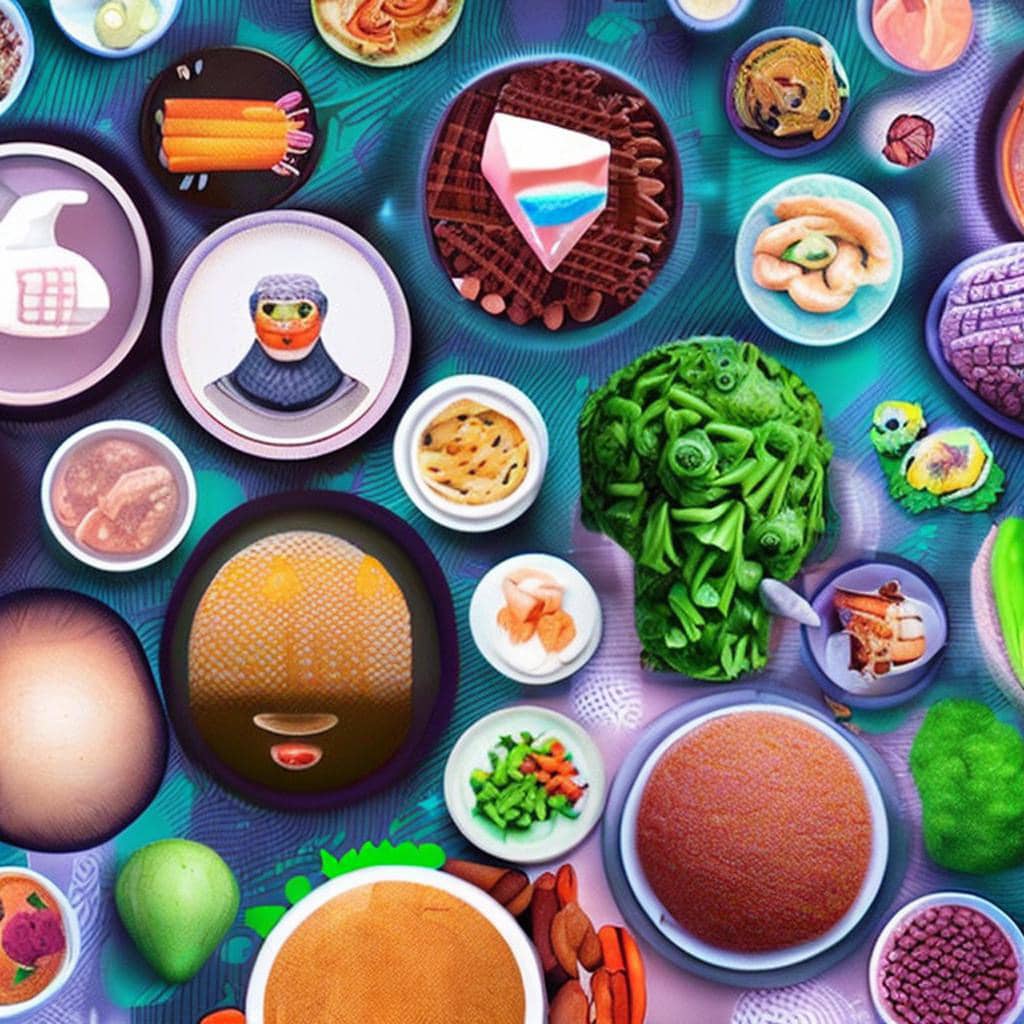AI, diets and nutrition
Artificial Intelligence (AI) has the potential to revolutionize the way we approach diets and nutrition. By analyzing large amounts of data, AI can help identify patterns and correlations between diet, health, and lifestyle factors, and provide personalized recommendations based on an individual’s unique needs and preferences.
For example, AI-powered nutrition apps can track an individual’s food intake and provide real-time feedback on their nutritional intake and suggest healthier alternatives based on their dietary preferences. Additionally, AI algorithms can analyze an individual’s genetic data to provide personalized recommendations on how to optimize their diet based on their genetic makeup.
AI can also assist in the development of new diets and nutritional supplements by identifying key nutrients and ingredients that are lacking in the average diet and recommending new sources of these nutrients. Moreover, AI can help identify the impact of dietary changes on an individual’s health by analyzing data from wearable devices and other health monitoring tools.
AI has the potential to play a significant role in improving our understanding of diets and nutrition, and helping individuals make informed decisions about their health and well-being.
AI, diets and nutrition on Amazon
Eating patterns?
Eating patterns refer to the regularity and timing of meals and snacks consumed by an individual over time. Some common eating patterns include three meals a day, six small meals a day, intermittent fasting, and grazing throughout the day.
Research suggests that eating patterns can have a significant impact on an individual’s health and well-being. For example, skipping meals or irregular eating patterns can lead to overeating and weight gain, while eating frequent, smaller meals may help regulate blood sugar levels and reduce the risk of chronic diseases such as diabetes and heart disease.
Intermittent fasting, which involves alternating periods of fasting and eating, has also gained popularity in recent years as a potential way to improve health and promote weight loss. Some studies suggest that intermittent fasting may improve metabolic health, reduce inflammation, and protect against age-related diseases.
It’s important to note that the optimal eating pattern may vary depending on an individual’s lifestyle, preferences, and health goals. A registered dietitian or healthcare provider can provide personalized recommendations based on an individual’s needs and preferences.

Fasting?
Fasting is the practice of abstaining from all or certain types of food and drink for a period of time. Fasting has been practiced for thousands of years for religious, spiritual, and health reasons.
There are different types of fasting, including water fasting, juice fasting, intermittent fasting, and time-restricted feeding. Water fasting involves consuming only water for a specified period, while juice fasting involves consuming only fruit and vegetable juices. Intermittent fasting involves cycling between periods of fasting and non-fasting, while time-restricted feeding involves limiting food intake to a specific window of time during the day.
Fasting has been linked to a variety of health benefits, including weight loss, improved metabolic health, lower inflammation, and improved brain function. It may also have potential benefits for the prevention and management of chronic diseases such as diabetes, heart disease, and cancer.
However, fasting can also have potential risks, particularly for those with certain health conditions or who are pregnant, breastfeeding, or underweight. It’s important to speak with a healthcare provider before starting a fasting regimen, particularly if you have any underlying health conditions.
Fasting can be a safe and effective way to improve health and well-being, but it’s important to approach it with caution and under the guidance of a healthcare professional.

Intermitent fasting?
Intermittent fasting is a type of fasting that involves cycling between periods of fasting and non-fasting. There are several different types of intermittent fasting, but the most common methods are:
Time-restricted feeding
This involves limiting food intake to a specific window of time each day, such as an 8-hour window. For example, someone might eat all of their meals between 12 pm and 8 pm, and then fast for the remaining 16 hours of the day.
Alternate-day fasting
This involves alternating between a day of fasting and a day of normal eating.
5:2 fasting
This involves eating normally for five days of the week and restricting calorie intake to 500-600 calories for the other two days.
Intermittent fasting has been associated with a variety of health benefits, including weight loss, improved metabolic health, lower inflammation, and improved brain function. It may also have potential benefits for the prevention and management of chronic diseases such as diabetes, heart disease, and cancer.
However, it’s important to approach intermittent fasting with caution and to speak with a healthcare provider before starting a fasting regimen, particularly if you have any underlying health conditions. Intermittent fasting may not be appropriate for everyone, and it’s important to ensure that you’re getting enough nutrients and calories during your eating periods.

Some accurate questions in the debate about AI and diet
Some accurate questions that could be asked in the debate about AI and diet:
How can AI be used to develop personalized nutrition plans based on an individual’s unique needs and preferences?
AI can be used to develop personalized nutrition plans based on an individual’s unique needs and preferences by analyzing large amounts of data about an individual’s health history, lifestyle, dietary habits, and genetic makeup. This data can be used to create algorithms that generate customized dietary recommendations that are tailored to the individual’s needs and goals.
For example, an AI-powered nutrition app may ask users to input their age, gender, weight, height, physical activity level, and dietary preferences. The app could then analyze this data, along with data from wearable devices and other health monitoring tools, to provide personalized recommendations on nutrient intake, calorie goals, and meal planning.
AI can also help track an individual’s food intake and provide real-time feedback on their nutritional intake and suggest healthier alternatives based on their dietary preferences. Additionally, AI algorithms can analyze an individual’s genetic data to provide personalized recommendations on how to optimize their diet based on their genetic makeup.
AI has the potential to revolutionize the way we approach diets and nutrition by providing personalized recommendations that take into account an individual’s unique needs and preferences.

What ethical considerations should be taken into account when developing AI-powered nutrition apps and tools?
The development of AI-powered nutrition apps and tools raises several ethical considerations. For example, there are concerns about data privacy and security, as these apps may collect and store sensitive information about an individual’s health and lifestyle. It’s important that developers of AI-powered nutrition apps and tools adhere to strict data privacy and security standards to protect the confidentiality of users’ data.
There is also the risk that AI-powered nutrition recommendations could reinforce unhealthy dietary practices or lead to disordered eating patterns. For example, an app that encourages very low-calorie diets or excessive fasting could be harmful to some users. Developers should ensure that their apps and tools promote healthy and sustainable dietary practices and do not promote dangerous or extreme weight loss methods.
Finally, there is the potential for AI-powered nutrition apps and tools to exacerbate health disparities by providing personalized recommendations that are not accessible or affordable for everyone. Developers should take steps to ensure that their apps and tools are accessible to people of all income levels and provide recommendations that are affordable and achievable for a wide range of individuals.
It’s important for developers of AI-powered nutrition apps and tools to be transparent about their data collection and use practices, prioritize user safety and privacy, and promote healthy and sustainable dietary practices.

Can AI accurately analyze an individual’s genetic data to provide personalized recommendations for optimizing their diet?
AI can accurately analyze an individual’s genetic data to provide personalized recommendations for optimizing their diet. By analyzing an individual’s genetic data, AI algorithms can identify genetic variants that may affect nutrient metabolism, food sensitivities, and other factors that influence dietary needs.
For example, a genetic test may reveal that an individual has a variant that affects their ability to metabolize caffeine or lactose. Based on this information, an AI-powered nutrition app could recommend dietary changes or alternative food sources to accommodate these genetic variations.
However, it’s important to note that genetic testing and analysis are still in their early stages and may not be fully accurate or comprehensive. There is also the risk of overreliance on genetic information, which could lead to the neglect of other important factors that influence dietary needs, such as lifestyle, environmental factors, and personal preferences.
While AI can provide valuable insights into an individual’s dietary needs based on genetic information, it should be used in conjunction with other forms of health information to develop a comprehensive and personalized nutrition plan.
How can AI be used to identify new sources of key nutrients and ingredients that are lacking in the average diet?
AI can be used to identify new sources of key nutrients and ingredients that are lacking in the average diet. By analyzing large amounts of data on food production, consumption, and nutrient content, AI algorithms can identify gaps in nutrient intake and recommend alternative food sources that are rich in these nutrients.
For example, if data analysis shows that a particular population is deficient in vitamin D, an AI-powered nutrition app could recommend dietary changes or supplements that provide adequate amounts of this nutrient. Additionally, AI could identify alternative food sources that are high in vitamin D, such as certain types of fish, mushrooms, or fortified foods.
AI could also help identify new and innovative food sources that could help address nutritional deficiencies in a sustainable and cost-effective manner. For example, AI could analyze data on the nutrient content of plant-based proteins and recommend alternative protein sources for individuals who are unable or unwilling to consume animal-based proteins.
AI has the potential to identify new sources of key nutrients and ingredients that could help address nutritional deficiencies and promote healthier and more sustainable dietary practices.

Can AI be used to predict the long-term impact of dietary changes on an individual’s health?
AI can be used to predict the long-term impact of dietary changes on an individual’s health by analyzing data from wearable devices, health monitoring tools, and electronic health records. By collecting and analyzing this data over time, AI algorithms can identify patterns and correlations between dietary factors and health outcomes.
For example, an AI-powered nutrition app may track an individual’s food intake, physical activity, sleep patterns, and other health metrics over a period of several months or years. The app could then use this data to predict the individual’s long-term risk of developing chronic diseases such as diabetes or heart disease, based on their current dietary habits.
AI could also be used to evaluate the effectiveness of dietary interventions and make recommendations for further improvements. For example, an AI-powered nutrition app could analyze data on an individual’s weight, blood pressure, cholesterol levels, and other health markers before and after a dietary intervention, and make recommendations for further dietary changes based on the individual’s response to the intervention.
AI has the potential to provide valuable insights into the long-term impact of dietary changes on an individual’s health, and help individuals make informed decisions about their dietary choices based on their unique needs and health goals.
How can AI be used to improve the accuracy of food tracking and calorie counting in nutrition apps?
AI can be used to improve the accuracy of food tracking and calorie counting in nutrition apps. By analyzing large amounts of data on food composition and portion sizes, AI algorithms can provide more accurate and precise estimates of nutrient content and calorie intake.
For example, an AI-powered nutrition app may use image recognition technology to analyze a photo of a meal and estimate the nutrient content and calorie intake of each component. This technology could help improve the accuracy of food tracking and reduce the need for manual entry of food items.
AI could also be used to improve the accuracy of calorie estimates for restaurant meals or other prepared foods that may not have detailed nutrition information available. By analyzing data on the nutrient content and portion sizes of similar foods, AI algorithms can provide more accurate calorie estimates for these foods.
AI has the potential to improve the accuracy and convenience of food tracking and calorie counting, which can help individuals make more informed decisions about their dietary choices and achieve their health and fitness goals more effectively.

What impact could AI have on the nutrition industry, including food production and marketing?
AI could have a significant impact on the nutrition industry, including food production and marketing. By analyzing data on consumer preferences, dietary trends, and nutritional needs, AI algorithms could help food companies develop new products that meet consumer demand for healthier, more sustainable, and more personalized food options.
For example, AI could help identify key nutrients or ingredients that are lacking in the average diet and recommend new sources of these nutrients or ingredients. AI could also analyze data on consumer preferences and suggest new flavors or product formulations that are more appealing to consumers.
In addition, AI could help food companies optimize their production processes to reduce waste and increase efficiency. By analyzing data on food production, supply chain logistics, and consumer demand, AI algorithms could help food companies streamline their operations and reduce their environmental impact.
However, there are also concerns about the potential for AI-powered food marketing to manipulate consumer behavior and promote unhealthy dietary practices. It will be important for food companies and regulators to ensure that AI-powered food marketing is transparent, ethical, and promotes healthy and sustainable dietary practices.
AI has the potential to drive innovation and improve the sustainability and healthfulness of the food industry, but it will be important to approach this technology with caution and ensure that it is used in a responsible and ethical manner.

What are the potential limitations and drawbacks of relying on AI for dietary recommendations?
There are several potential limitations and drawbacks of relying on AI for dietary recommendations. One of the main concerns is the risk of over-reliance on technology and the neglect of other important factors that influence dietary needs, such as lifestyle, environmental factors, and personal preferences.
Another concern is the potential for AI algorithms to reinforce biases or promote unhealthy dietary practices. For example, if an AI algorithm is trained on data from a population with a high prevalence of a particular dietary pattern, it may promote this pattern to other individuals even if it is not appropriate for their needs or goals.
There is also the risk that AI-powered nutrition recommendations could be too generic or simplistic, and fail to take into account the complexity and variability of individual dietary needs. AI algorithms may not be able to fully capture the nuances and subtleties of an individual’s dietary preferences and lifestyle, and may provide recommendations that are not practical or sustainable in the long-term.
Finally, there is the potential for AI-powered nutrition recommendations to be misinterpreted or applied incorrectly, leading to unintended consequences or adverse health outcomes.
While AI has the potential to provide valuable insights into dietary needs and support healthy and sustainable dietary practices, it should be used in conjunction with other forms of health information and approached with caution to ensure that recommendations are personalized, practical, and safe.

How can AI be used to support healthcare providers in providing personalized nutrition counseling to patients?
AI can be used to support healthcare providers in providing personalized nutrition counseling to patients. By analyzing large amounts of data on an individual’s health history, lifestyle, and dietary habits, AI algorithms can provide healthcare providers with valuable insights into an individual’s dietary needs and preferences.
For example, an AI-powered nutrition app could analyze an individual’s food intake, physical activity, and health metrics over time, and provide healthcare providers with a detailed report on the individual’s nutritional status and any potential deficiencies or health risks.
AI could also provide healthcare providers with personalized recommendations for dietary changes and meal planning based on an individual’s unique needs and preferences. This could help improve the effectiveness of nutrition counseling and support individuals in achieving their health and wellness goals.
However, it’s important to note that AI should not replace the role of healthcare providers in providing personalized nutrition counseling. Rather, AI should be used as a tool to support healthcare providers in providing more effective and personalized care.
AI has the potential to improve the quality and effectiveness of nutrition counseling and support individuals in achieving their health and wellness goals, but it should be used in conjunction with other forms of health information and under the guidance of a healthcare provider.

What role could AI play in addressing public health challenges related to diet and nutrition, such as obesity and chronic diseases?
AI could play a significant role in addressing public health challenges related to diet and nutrition, such as obesity and chronic diseases. By providing personalized nutrition recommendations and promoting healthy and sustainable dietary practices, AI has the potential to improve the health and well-being of individuals and communities.
For example, AI-powered nutrition apps and tools could help individuals make more informed decisions about their dietary choices and track their progress towards health goals. AI could also support healthcare providers in identifying and addressing nutritional deficiencies and promoting healthy eating habits among patients.
AI could also help address food insecurity and promote sustainable food production and consumption practices. By analyzing data on food production, distribution, and consumption, AI algorithms could help identify gaps in food access and recommend policies and programs to address these gaps. AI could also help food companies optimize their production processes to reduce waste and increase efficiency, leading to a more sustainable and equitable food system.
However, it’s important to note that AI is not a panacea for public health challenges related to diet and nutrition. Addressing these challenges will require a comprehensive and multi-faceted approach that includes education, policy, and systemic change.
AI has the potential to play an important role in improving public health related to diet and nutrition, but it should be used in conjunction with other interventions and approaches to promote sustainable and equitable health outcomes.
Table summarizing the questions and answers with fields of application and points of action
| Question | Fields of Application | Points of Action |
| 1. How can AI be used to develop personalized nutrition plans based on an individual’s unique needs and preferences? | Nutrition apps and tools | Analyzing data on an individual’s health history, lifestyle, dietary habits, and genetic makeup to create algorithms that generate customized dietary recommendations. |
| 2. What ethical considerations should be taken into account when developing AI-powered nutrition apps and tools? | Nutrition apps and tools | Prioritizing user safety and privacy, promoting healthy and sustainable dietary practices, and ensuring that recommendations are accessible and affordable for all individuals. |
| 3. Can AI accurately analyze an individual’s genetic data to provide personalized recommendations for optimizing their diet? | Genetic testing and analysis | Identifying genetic variants that affect nutrient metabolism, food sensitivities, and other factors that influence dietary needs. |
| 4. How can AI be used to identify new sources of key nutrients and ingredients that are lacking in the average diet? | Food production and consumption | Analyzing data on food production, consumption, and nutrient content to identify gaps in nutrient intake and recommend alternative food sources. |
| 5. Can AI be used to predict the long-term impact of dietary changes on an individual’s health? | Wearable devices, health monitoring tools, and electronic health records | Collecting and analyzing data over time to identify patterns and correlations between dietary factors and health outcomes. |
| 6. How can AI be used to improve the accuracy of food tracking and calorie counting in nutrition apps? | Nutrition apps and tools | Analyzing data on food composition and portion sizes to provide more accurate and precise estimates of nutrient content and calorie intake. |
| 7. What impact could AI have on the nutrition industry, including food production and marketing? | Food production and marketing | Driving innovation and improving the sustainability and healthfulness of the food industry, but promoting ethical and responsible use of AI to avoid manipulation of consumer behavior and promote healthy dietary practices. |
| 8. What are the potential limitations and drawbacks of relying on AI for dietary recommendations? | Nutrition apps and tools | Over-reliance on technology, risk of promoting biases or unhealthy dietary practices, providing recommendations that are too generic or simplistic, and potential for misinterpretation or incorrect application of recommendations. |
| 9. How can AI be used to support healthcare providers in providing personalized nutrition counseling to patients? | Healthcare | Analyzing data on an individual’s health history, lifestyle, and dietary habits to provide healthcare providers with valuable insights into an individual’s dietary needs and preferences, and personalized recommendations for dietary changes and meal planning. |
| 10. What role could AI play in addressing public health challenges related to diet and nutrition, such as obesity and chronic diseases? | Public health | Providing personalized nutrition recommendations, promoting healthy and sustainable dietary practices, addressing food insecurity, and promoting sustainable food production and consumption practices. |
Shop tips
AI, diets and nutrition on Amazon

Thank you for questions, shares and comments!
Share your thoughts or questions in the comments below!
Source OpenAI’s GPT language models, Fleeky, MIB, & Picsart






